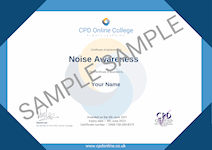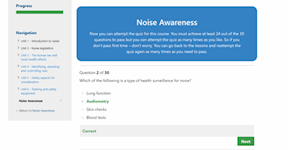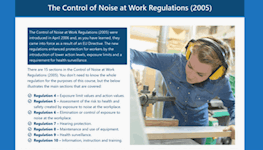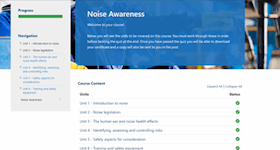Noise awareness CPD Course
Online CPD course exploring the ways that workers can keep themselves safe when working with noise
CPD Online College
Summary
- Exam(s) / assessment(s) is included in price
Add to basket or enquire
Overview
People who are at higher risk of exposure to noise need to be able to protect themselves from hearing damage. This course explores the consequences of exposure to noise and the ways that workers can keep themselves safe.
CPD
Course media
Description
This course covers everything that you need to know about keeping yourself and others safe when working in conditions where you are exposed to noise. The units cover what noise is, how to measure sound, safety equipment as well as legislation relating to noise in the workplace.
The signs and symptoms of temporary and permanent hearing loss are discussed so that students are aware of the consequences of over-exposure to noise. Risk assessment skills will also be explored so that the chances of hearing damage is reduced.
This course is suitable for people who are at risk of noise, this includes construction workers, road workers, demolition workers, manufacturing workers and agricultural workers. On completion of the course, students will feel they have better knowledge on noise and the risks it can have to peoples health. Students will also know now how to keep themselves and others safe at work.
In order to complete the course, you must achieve 80% or more in the final multiple choice quiz.
You will earn 3 CPD points on completion of the course, this course will take around 3 hours to complete and the certificate will last for two years.
- Fully CPD registered
- Completed online with instant downloadable certificate
- Fully printed certificate posted next day
- Covers all required legislation and practices
- Explains the risks of exposure to noise
- Counted as staff training on noise awareness
- Complete the online multiple choice assessment as many times as you need to pass
Units covered
- Unit 1 – Introduction to noise – In our first unit we will be looking at what noise is, including what sound is and how the characteristics of sound waves affect the level of noise. We will also look at the terminology used in sound measurement and explore the decibel scales and frequency weightings in further detail.
- Unit 2 – Noise legislation – In this unit we will be exploring the general legislation such as Health and Safety Work Act 1974, the Management of Health and Safety at Work Regulations 1999, Noise at Work Regulations 1989 and the Control of Noise at Work Regulations 2005. We will also look at environmental noise legislation applicable to workplaces.
- Unit 3 – The human ear and noise health effects – In this unit we will explore the physiology of the human ear, including the three main sections. We will also learn about some of the health effects that can occur from exposure to hazardous noise levels and the temporary and permanent effects. We will also look at some of the signs and symptoms of hearing loss.
- Unit 4 – Identifying, assessing and controlling risks – This unit will look at the overall requirements of noise risk assessment in the Control of Noise at Work Regulations 2005, we will also explore why risk assessments are important and will cover the legal, moral and financial reasons. We will also explore the steps that should be taken when carrying out a risk assessment
- Unit 5 – Safety aspects for consideration – This unit will look at an overview of why noise needs to be controlled and will look at how sound waves can reach workers in the workplace. We will also explore methods of controlling risks.
- Unit 6 – Training and safety equipment – In our final unit we will be considering the different types of noise training and why it is required to complete them. We will also look at what Personal Protective Equipment (PPE) is and why it shouldn’t be the first choice in control measures. This unit will finish off by exploring the requirements for maintenance of hearing protection.
Who is this course for?
This course is perfect for people who are at higher risk of exposure to noise.
Requirements
There are no requirements to complete this course
Career path
This course is perfect for people who are at higher risk of exposure to noise.
Reviews
Currently there are no reviews for this course. Be the first to leave a review.
Legal information
This course is advertised on reed.co.uk by the Course Provider, whose terms and conditions apply. Purchases are made directly from the Course Provider, and as such, content and materials are supplied by the Course Provider directly. Reed is acting as agent and not reseller in relation to this course. Reed's only responsibility is to facilitate your payment for the course. It is your responsibility to review and agree to the Course Provider's terms and conditions and satisfy yourself as to the suitability of the course you intend to purchase. Reed will not have any responsibility for the content of the course and/or associated materials.







